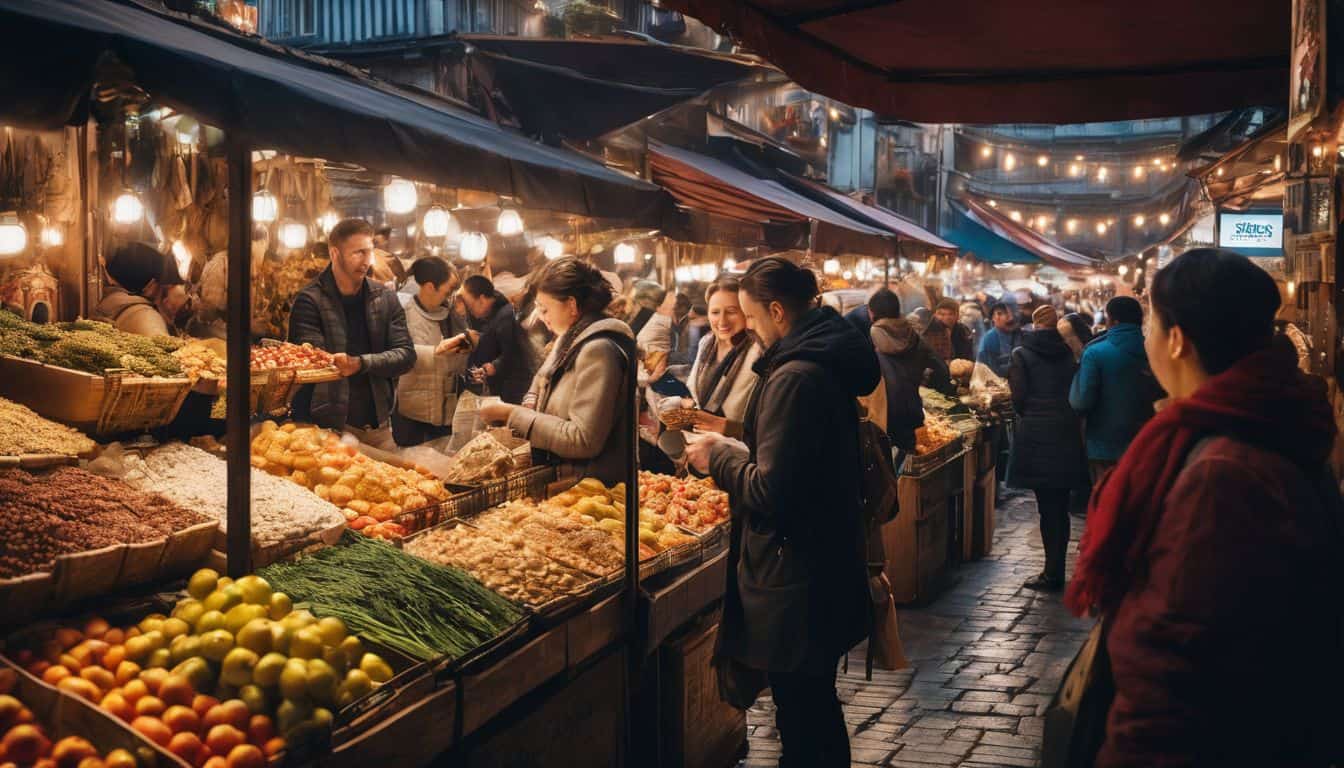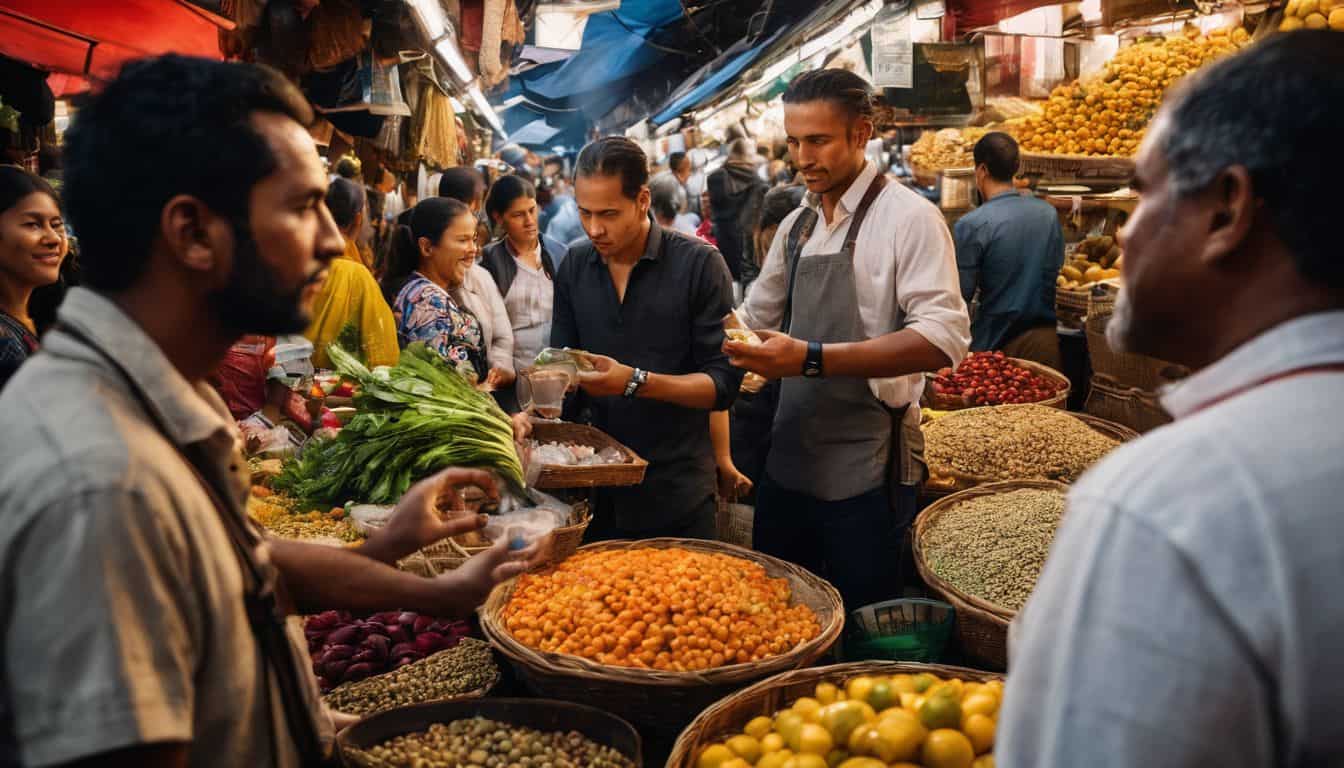Have you ever sat and pondered over how knowing some basic survival skills could brace you for potential economic adversity or unplanned crises? Yeah, me too. That’s why I immersed myself in deep research and hands-on experiences to truly comprehend the significance of bartering as a crucial life-saving skill.
In this insightful piece, we’ll navigate together through nine practical strategies that can set you up for success with bartering skills in diverse survival cases – from grasping elementary principles to pinpointing sought-after items and mastering an influential negotiation strategy.
So come on, let’s stand shoulder-to-shoulder to prepare for those unexpected curveballs life may throw!
Key Takeaways
- Bartering is an important skill to have in survival scenarios because it allows you to acquire necessary resources when traditional methods fail.
- Key bartering skills include trading water, food, shelter items, medical supplies, tools, services, clothing, fire-making items, and hygiene products.
- To be successful at bartering in survival situations:
- Understand the basics of bartering and what items hold value.
- Choose the right items to stockpile for trade.
- Develop effective negotiation skills by building rapport and finding common ground.
- Establish trust and build relationships with potential trading partners.
- Set fair trade values based on usefulness, rarity, demand, and research.
The Importance of Bartering in Survival Scenarios
Bartering in survival scenarios is crucial because it allows individuals to obtain necessary resources and items that may not be readily available or affordable through traditional means of exchange.
Pros and cons of survival bartering
Survival bartering is a method of acquiring resources that has both advantages and drawbacks. Here’s a table to illustrate the pros and cons.
| Pros | Cons |
|---|---|
| Survival bartering offers an alternative method of acquiring resources when money is scarce or worthless. This fact makes it a key survival strategy in a post-collapse scenario. | Bartering lacks a universal measure of value, which can lead to unequal exchanges. One party may undervalue their items or skills, leading to a loss. |
| Bartering fosters a sense of community and mutual support. It relies on trust and cooperation, helping to build relationships within your survival network. | Trading can risk your safety, especially if the other party has harmful intentions. This is why it’s essential to take precautions and avoid trading weapons, especially initially. |
| Bartering allows you to leverage your survival skills and supplies in exchange for items you need. This could be lifesaving in a survival situation, especially if you have high-demand skills. | Establishing fair trade values can be tricky. Without a standard value system, you would need good negotiation skills and a clear understanding of the worth of your items or skills. |
Overall, the benefits of survival bartering can outweigh the drawbacks, especially in survival scenarios where traditional forms of purchasing are no longer feasible. However, it’s crucial to approach bartering with a clear strategy, a good understanding of the value of your assets, and a careful consideration of safety.
The difference between bartering and using money
Bartering is a way to trade goods or services. It does not use money. You need to talk and decide what each thing is worth. Both people must agree before the trade happens.
Money, on the other hand, makes trading easier. Everyone knows what a dollar bill is worth. So, you don’t have to spend time talking about value every time you want to buy something.
But in survival situations where money may lose all its value, bartering could become vital again.
Bartering skills that are valuable in survival situations
Bartering can help you survive in tough times. Here are some useful skills.
- Know how to trade water and food. These are the basic needs of every person.
- Understand how to swap fuel and shelter items. People will need them to stay warm and safe.
- Learn to deal with medical stuff like bandages and medicine. Health is top priority in a survival case.
- Get good at trading tools for building or hunting like knives and ropes.
- Be ready to offer services like fixing things or teaching skills.
- Learn about trading clothes, especially warm jackets and boots.
- Get the knowledge about bartering fire – making things such as matches or lighters.
- Know how to handle trade for cooking items like pots or pans.
- Last but not least, learn how barter hygiene items such as soap or toilet paper.
Basics of Bartering Skills in Survival Scenarios
Essential Barter Items to Store
Choose the right items for bartering and discover multi-use items that are in high demand. Find out more about essential barter items to store by reading on!
Choosing the right items for bartering
When preparing for survival scenarios, it’s important to choose the right items for bartering. Here are some key things to consider:
- Stock up on essential survival supplies like water, food, shelter materials, and fuel. These items meet basic needs and will be in high demand.
- Canned goods are great for bartering because they have a long shelf life and provide nutrition. Look for canned meat products, fruits, vegetables, and soup varieties.
- Consider items that can be easily produced or made in a survival scenario. This includes things like seeds for growing food, tools for building and repairing, and even homemade crafts or clothing.
- Think about your own skills and expertise. These can be valuable barter items too! If you have medical knowledge, carpentry skills, or hunting abilities, you can trade these services in exchange for other supplies.
- Don’t forget about non – perishable luxury items that people might want as well. Things like coffee, spices, hygiene products, or small comforts can be traded for other necessities.
Multi-use items that are in high demand
In survival scenarios, it’s important to have multi-use items that are in high demand for bartering. Here are some examples of these valuable barter items:
- Food and water: These essentials will always be in high demand during a crisis.
- Medications and first aid supplies: People will need medical assistance, so having these items can be extremely valuable.
- Tools and equipment: Items like knives, axes, and saws can be used for various tasks, making them highly sought after.
- Clothing and protective gear: Good-quality clothing and gear that can protect against the elements will be in demand.
- Personal hygiene items: Things like toilet paper, soap, toothpaste, and feminine products will be valuable commodities.
- Batteries and power sources: In a world without electricity, having power sources like batteries or solar panels can be invaluable.
- Fuel and fire-starting materials: People will need fuel for transportation or heating purposes, as well as ways to start fires for cooking and warmth.
- Bartering goods like cigarettes or alcohol: While not essential items, these goods often have universal value for trade.
- Skills and knowledge: Offering your expertise in areas like medicine, construction, or food preservation can also be highly desired.
Bartering Strategies for Success
Mastering effective negotiation, building trust, and setting fair trade values are crucial in successfully navigating bartering scenarios. Discover expert tips to maximize your chances of success in survival bartering.
Read more for valuable insights on how to thrive in post-collapse trading environments.
Tips for effective negotiation
When it comes to survival scenarios, knowing how to negotiate effectively is crucial. Here are some tips that can help you become a better negotiator:
- Build rapport: Establishing a good relationship with the other party is important. Show interest in their needs and concerns, and be respectful and friendly.
- Listen actively: Pay close attention to what the other person is saying. Ask clarifying questions and empathize with their perspective. This will help you understand their priorities and find common ground.
- Ask good questions: Gathering information is key in negotiation. Ask open-ended questions to uncover their underlying interests, goals, and constraints. This will help you find creative solutions that meet both parties’ needs.
- Analyze alternatives: Before entering into negotiations, think about your Best Alternative to a Negotiated Agreement (BATNA). Understanding your alternatives will give you confidence and leverage during the negotiation process.
- Find areas of agreement: Look for shared interests and values that can serve as a starting point for collaboration. By focusing on these commonalities, you can create win-win solutions that benefit both parties.
- Collaborate problem-solving: Instead of trying to “win” the negotiation, aim for collaborative problem-solving. Work together to find mutually beneficial solutions that address both parties’ concerns.
Establishing trust and building relationships
Building trust and relationships are essential for successful bartering in survival scenarios. When it comes to bartering, collaborative exchanges and reciprocal relationships form the foundation of a strong network.
Trustworthiness and reliability are key traits that others look for in potential trading partners. By establishing clear rules and boundaries, you can create an environment where both parties feel comfortable and secure.
Interdependence and networking with like-minded individuals allow for mutual benefits and long-term partnerships. Remember, in post-collapse scenarios, trust becomes even more crucial as resources become scarce.
Setting fair trade values
Setting fair trade values is crucial for successful bartering in survival scenarios. Here are some key points to keep in mind:
- Evaluate the worth: Consider the usefulness, rarity, and demand of the item or service you are offering for trade.
- Research similar trades: Look into what others have traded in similar situations to get an idea of fair values.
- Negotiation skills: Hone your negotiation skills to ensure you get a fair deal. Be open to compromise and find mutually beneficial solutions.
- Be mindful of supply and demand: Take into account the scarcity or abundance of certain items or services when setting trade values.
- Establish trust: Building trust with potential trading partners is essential. Communicate openly and honestly about what you are offering and expecting in return.
- Adaptability: Be willing to adjust your trade values based on changing circumstances or the needs of others.
- Keep records: Maintain a record of past trades and their values to help guide future bartering negotiations.

Bartering in a Post-Collapse Scenario
In a post-collapse scenario, learning from historical examples, such as The Great Depression, can provide valuable insights into bartering practices and the importance of identifying valuable skills and resources for trade.
Lessons from historical examples (e.g., The Great Depression)
During the Great Depression, bartering became a common and effective way to obtain needed goods without traditional currency. People would exchange items like eggs, fresh milk, or produce for other items they needed.
This historical example shows us that in times of economic downturn or crisis, bartering can be a valuable skill for survival. By learning from past experiences like the Great Depression, we can understand the importance of having useful items to trade and establishing networks for mutual exchange.
Taking these lessons into account can help us prepare for potential post-collapse scenarios where bartering may become essential.
Identifying valuable skills and resources for bartering
During a crisis, it’s important to know which skills and resources are valuable for bartering. Here are some key ones to consider:
- Survival Skills: Skills like hunting, fishing, gardening, and first aid can be highly valuable in a post-collapse scenario.
- Repair and Maintenance Skills: Being able to fix things like clothing, tools, or equipment is a valuable skill that others may need.
- Food and Water: Stockpiling non-perishable food items and clean water can be valuable for trade when resources become scarce.
- Energy Sources: Having alternative energy sources like solar panels or portable generators can be in high demand during a crisis.
- Herbal Medicine Knowledge: Knowing how to identify and use medicinal plants can be invaluable when traditional medicine is no longer available.
- Construction Skills: The ability to build or repair structures using basic materials can be highly sought after in a post-collapse world.
- Barter Items: Stockpiling items like toiletries, batteries, matches, or hygiene products can serve as excellent barter items.
- Communication Devices: Having access to radios or walkie-talkies can be crucial for maintaining communication in an isolated environment.
- Security Measures: Knowledge of self-defense techniques or having security systems in place can provide value and protection for others.
Preparing for a long-term disaster or economic collapse
I understand that preparing for a long-term disaster or economic collapse is important for survival. It’s crucial to be ready for any situation that may come our way. When faced with such challenges, it’s essential to have the necessary skills and resources to survive.
During an economic collapse, the value of money diminishes, and resources become more valuable than ever before. By being prepared, you can ensure that you have the items needed for bartering in a post-collapse society.
This means having essential supplies stockpiled and understanding what items will hold value in this new economy.
In addition to physical resources, building relationships and establishing trust with others will also be key in successful bartering during a crisis. By working together and creating a local bartering network, we can support each other and trade goods or services that are needed.
By considering historical examples like The Great Depression, we can learn lessons from those who survived difficult times before us. Identifying valuable skills and resources for bartering is important as well.
Creating a Local Bartering Network
To create a local bartering network, start by finding like-minded individuals who are interested in trading goods and services.
Tips on starting and sustaining a local bartering community
Starting and sustaining a local bartering community can be a rewarding experience. Here are some tips to help you get started:
- Connect with like-minded individuals: Look for people in your area who are interested in bartering and building a local economy. You can join online forums, attend community events, or even start a meetup group.
- Share your skills: Offer to teach others a skill you possess, such as gardening, sewing, or woodworking. By sharing your knowledge, you can create a sense of community and encourage others to participate in bartering.
- Start small: Begin by bartering with friends and neighbors to establish trust and build relationships. This will help you gain confidence in the process before expanding to a larger network.
- Establish clear rules: Create guidelines that everyone agrees upon to ensure fair and honest trades. This includes determining the value of items or services being exchanged and setting boundaries for what is acceptable to trade.
- Communicate effectively: Keep open lines of communication with other members of the bartering community. This will help resolve any issues that may arise and maintain positive relationships.
- Seek out complementary skills: Look for individuals who have skills or resources that complement yours. By exchanging goods or services that both parties need, you can create mutually beneficial trades.
- Promote sustainability: Encourage members of the bartering community to prioritize eco-friendly practices and sustainable living. This could include trading organic produce or promoting upcycling projects.
- Support local businesses. Incorporate local businesses into your bartering network by offering their products or services in exchange for items you need. This helps strengthen the local economy and fosters collaboration within the community.
- Be patient and adaptable: Building a successful bartering community takes time, effort, and flexibility. Stay open-minded and willing to adapt as new members join or circumstances change.
Finding like-minded individuals for bartering partnerships
In survival scenarios, it’s important to find people who have the same mindset as you when it comes to bartering. Here are some tips for finding like-minded individuals for bartering partnerships:
- Join local survival groups or communities: Look for local groups or communities that focus on survival and preparedness. These groups often have members who are interested in bartering and trading.
- Attend survival workshops and events: Attend workshops, seminars, or events related to survival skills. This is a great way to meet people who share your interests and may be interested in bartering.
- Online forums and social media groups: Join online forums or social media groups dedicated to survival and preparedness. These platforms provide opportunities to connect with like-minded individuals from all over the world.
- Network with friends and neighbors: Talk to your friends, neighbors, and colleagues about your interest in bartering. They may know someone who shares the same passion or have skills/resources they are willing to trade.
- Local farmers’ markets and trade fairs: Visit local farmers’ markets or trade fairs where you can meet people who value self-sufficiency, sustainability, and alternative forms of trade.
- Community bulletin boards: Check out community bulletin boards at local grocery stores, libraries, or community centers. People often post ads looking for bartering partners or items they want to trade.
- Volunteer organizations: Get involved with volunteer organizations that focus on disaster relief or community support during emergencies. These organizations attract individuals who understand the importance of bartering in challenging situations.
- Trade-specific websites/applications: Explore websites or apps specifically designed for trading goods or services without using money. These platforms connect like-minded individuals who are open to non-monetary transactions.
- Start your own bartering group: If you can’t find an existing group in your area, consider starting your own bartering group by inviting people who are interested in trading and sharing resources.
Prepping Skills That Hold Barter Value
Mastering essential survival skills increases your value in a bartering situation, ensuring that you have valuable expertise to trade with others.
Survival skills that can be traded and cannot be stolen
In survival scenarios, there are certain skills that can be traded for goods or services. These skills are valuable because they cannot be easily stolen. Here are some survival skills that hold barter value:
- First aid and medical training: Being able to provide medical assistance in an emergency is a highly valuable skill that others will trade for.
- Hunting and trapping skills: The ability to procure food through hunting or trapping is essential in survival situations. Others may be willing to trade for fresh meat or assistance in procuring it.
- Shelter construction: Knowing how to build sturdy and secure shelters using natural resources is a skill that others will find valuable, especially in harsh weather conditions.
- Fire-making: The ability to start a fire without matches or lighters is crucial for warmth, cooking, and signal fires. This skill can be traded for various items or services.
- Water purification: Having the knowledge and tools to purify water from natural sources is vital for survival. Others may be willing to trade for clean and safe drinking water.
- Foraging and plant identification: Knowing which wild plants are safe to eat and how to find them can be a lifesaver in survival situations. Your expertise in this area can be traded for other resources.
- Navigation skills: Being able to navigate using maps, compasses, or natural landmarks is valuable in finding your way in unfamiliar territories. Others may trade for guidance or assistance with navigation.
- Mechanical repair skills: If you have mechanical repair skills, such as fixing engines or machinery, others may trade with you for repairs on their equipment or vehicles.
- Communication skills: In a post-collapse scenario where technology may not be available, people who can establish communication networks using alternative methods like radios or Morse code will have a valuable skill set that others may trade for.
Building expertise in high-demand areas
I believe that building expertise in high-demand areas is crucial for survival enthusiasts like us. Here are some key areas to focus on:
- Medical Skills: Learning first aid, CPR, and basic medical procedures can be invaluable in a crisis.
- Food Production: Growing your own food through gardening or aquaponics can provide sustenance during challenging times.
- Hunting and Fishing: Developing skills in hunting and fishing can help you obtain protein-rich food when resources are scarce.
- Water Purification: Knowing how to purify water using simple methods such as boiling or filtration is essential for staying healthy.
- Self-Defense: Learning self-defense techniques can help protect yourself and your loved ones in dangerous situations.
- Shelter Building: Acquiring knowledge on constructing temporary shelters using natural materials is important for survival in the wilderness.
- Fire Starting: Mastering various fire-starting techniques will keep you warm, allow cooking, and provide a sense of security.
- Navigation Skills: Understanding how to read maps, use a compass, or navigate by the stars can help you find your way in unfamiliar terrain.
- Communication Skills: Learning Morse code or other signaling methods can enable communication over long distances without technology.
Bartering Rules to Follow
Establish clear rules and guidelines to ensure safety during bartering, such as avoiding the trading of weapons initially, and establishing boundaries to prevent any potential conflicts.
Safety precautions when bartering
When bartering in survival scenarios, it’s important to prioritize safety. Here are some key precautions to keep in mind:
- Always meet in a public and well – lit location.
- Bring a trusted friend or family member with you for added security.
- Avoid disclosing personal information or sharing your full name until you establish trust.
- Trust your instincts – if something feels off or unsafe, walk away.
- Be cautious when trading high – value items, as they may attract unwanted attention.
- Don’t carry large amounts of cash or valuable items on you during the trade.
- Consider using a code word or secret signal to communicate with your trusted companion during the exchange.
- Research the person you’re bartering with beforehand to ensure they have a good reputation within the community.
- If possible, conduct trades during daylight hours to minimize potential risks.
Avoiding trading weapons initially
In survival scenarios, trading weapons like guns and ammunition might seem valuable for protection. However, it’s important to consider the potential dangers and risks associated with trading these items.
That’s why it is safer to avoid trading weapons initially. As a survival enthusiast, I understand that self-preservation is crucial, but it’s also essential to prioritize long-term safety and prevent any harm that could come back to haunt us in the future.
So instead of engaging in weapon trades right away, let’s focus on establishing trust, building relationships, and swapping valuable resources within our self-reliant communities through peer-to-peer bartering.
Establishing clear rules and boundaries
In survival scenarios, it is important to establish clear rules and boundaries when it comes to bartering. Here are some key points to remember:
- Communication: Clearly communicate your needs, wants, and expectations during the bartering process.
- Agreement: Before engaging in any trade, make sure both parties agree on the terms of the exchange. This can be done verbally or in writing.
- Contract: Consider creating a written contract for more complex trades or when dealing with valuable items. This helps ensure everyone understands their responsibilities.
- Safety precautions: Meet in public places or well-lit areas when trading with strangers, especially if you’re exchanging high-value items.
- Fair trade values: Establish guidelines for fair exchanges to prevent misunderstandings or disagreements. Research the value of items beforehand to ensure fairness.
- Transparency: Be honest about the condition and quality of the items you’re offering for trade. Deceptive practices can tarnish your reputation within a bartering community.
- Boundaries: Determine what types of items you are not willing to trade or negotiate on, whether it’s for personal reasons or based on their usefulness in your survival plan.
- Trustworthiness: Build trust within your local bartering network by consistently keeping your word and following through on agreements.
- Flexibility: Be open to negotiating and adapting your offers based on the specific needs and preferences of the person you’re trading with.
Bartering Supplies for Post-Collapse Trading
Identifying valuable supplies for trade is essential in a post-collapse scenario. From food and water to medical supplies and tools, these items will be highly sought after. Read on to learn more about how to prepare for bartering in a survival situation.
Identifying valuable supplies for bartering
In survival scenarios, it’s important to know which supplies are valuable for bartering. Here are some items that can be highly sought-after:
- Water: Clean drinking water is crucial for survival and will always be in high demand.
- Food: Non-perishable food items like canned goods or dried foods can be traded for other essentials.
- Shelter: Items like tents, sleeping bags, or tarps can provide protection and comfort and are valuable for trade.
- Fuel: Gasoline, propane, or firewood are essential for cooking, heating, and lighting, making them valuable commodities.
- Safety tools: Items like first aid kits, flashlights, batteries, or multi-tools can help ensure personal safety and are often in demand.
- Basic necessities: Toiletries, hygiene products, and personal care items are daily essentials that people will trade for.
- Medical supplies: Bandages, medications, or medical equipment can be invaluable in a crisis situation.
- Communication devices: Radios or walkie-talkies can help stay connected when other communication methods fail.
- Barter skills mastery: Developing skills that others may need (such as carpentry or medical knowledge) can also be valuable assets for trade.
Stockpiling essential items for trade
When it comes to surviving in difficult times, having essential items for trade is crucial. Here are some items you should consider stockpiling:
- Food and Water: These necessities are always in high demand during a crisis. Stock up on non-perishable food items like canned goods and dry goods, as well as bottled water or water purification tablets.
- Medications and First Aid Supplies: In a post-collapse scenario, access to medical care may be limited. Having a supply of over-the-counter medications, bandages, and other first aid supplies can be valuable for bartering.
- Tools and Equipment: Items like multi-tools, flashlights, batteries, and portable camping stoves can come in handy in survival situations. People will often be willing to trade for these useful tools.
- Personal Hygiene Items: Don’t forget about the importance of hygiene during tough times. Stockpile items like toilet paper, soap, toothpaste, and feminine hygiene products.
- Fuel Sources: Gasoline, propane tanks, or firewood can be valuable resources for cooking or heating purposes when traditional utilities are not available.
- Clothing and Blankets: Extra layers of clothing, warm blankets, socks, hats, and gloves can provide comfort and warmth during harsh conditions.
- Energy Sources: Consider stocking up on alternative energy sources such as solar chargers or portable generators as they can be highly sought after in a crisis.
- Seeds: For those with gardening skills or access to land suitable for growing crops, having a variety of vegetable seeds can bring long-term value in terms of food production.
- Basic Survival Gear: Items like compasses, binoculars, fishing gear or hunting equipment can serve multiple purposes and may be desirable for trading.
Conclusion on Bartering Skills in Survival Scenarios
In conclusion, developing bartering skills and accumulating physical resources are essential for survival scenarios. Building strong relationships and mastering key negotiation techniques will greatly increase your chances of success.
Remember to stockpile essential items and be prepared to adapt in a post-collapse scenario. With the right skills and preparation, you can navigate through challenging times and ensure your survival.
FAQs on Bartering Skills in Survival Scenarios
1. What are bartering skills and why are they important in survival scenarios?
Bartering skills involve exchanging goods or services without using money, which can be crucial in survival scenarios where traditional currency may not be available or valuable. It helps people obtain essential items they need to survive.
2. How can I develop my bartering skills?
You can develop your bartering skills by learning about the value of different items and understanding their usefulness in a survival situation. Practice negotiation and communication techniques to effectively trade with others.
3. What are some examples of items that are commonly used for bartering in survival situations?
Commonly traded items in survival scenarios include food, water, medicine, tools, fire-starting materials, clothing, and other useful supplies that people may need to survive.
4. Are there any specific strategies or tips for successful bartering in survival situations?
Some tips for successful bartering include knowing the value of what you have to offer and what you want in return, being flexible and willing to negotiate, building relationships with potential trading partners, and prioritizing essential needs over wants.
5. Can bartering also be done online or through digital platforms during a survival scenario?
Yes, if there is access to the internet or digital devices during a survival scenario, bartering can also occur online through platforms dedicated to facilitating trades without money exchange like online forums or social media groups specifically designed for this purpose.





Leave a Reply